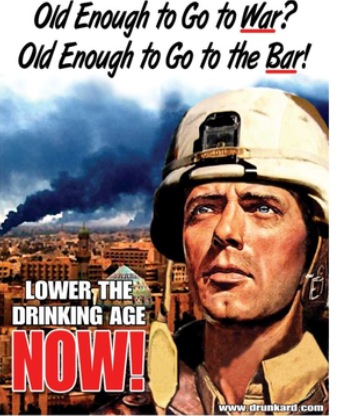The Case for a Lower Drinking Age
On July 17, 1984, the United States Congress passed the National Minimum Drinking Age Act, causing the drinking age to be raised to 21. While this act did not explicitly require the drinking aged to be raised from 18 to 21, the act punished any state that did not abide by this new requirement. Mothers Against Drunk Driving (MADD) was the driving force behind the movement to raise the drinking age, proporting that the increase in drinking age would decrease the number of drunk driving accidents in America.
In recent years, a large movement has developed that wants to reexamine the legal drinking age. In 2008, John McCardell, the current Vice-Chancellor of Sewanee, created the Amethyst Initiative, an organization of U.S. college presidents, including our own President Ruscio, which advocates rethinking the drinking age. These college presidents realize that the system is somewhat broken, acknowledging that the drinking age of 21 does not stop young people from drinking and perhaps even encourages more dangerous drinking habits.
Though I personally believe that lowering the drinking age to 19 would be the most beneficial to the country, for consistency’s sake, I will argue for lowering the age to 18. The following list presents just a few examples of rights and privileges that citizens are granted once they turn 18 in America:
- The right to own and possess a firearm
- The right to vote
- The right to sit on a jury
- The right to enlist in military service or be drafted into service
- The right to get married (which in many states begins at 16)
- The right to operate a motor vehicle without restriction
It seems a bit hypocritical to me that our country would grant us the rights listed above, many of which are dangerous and can life-changing consequences, but have the audacity to say that these same people are not responsible enough to purchase and consume alcohol.
Though statistics show that drunk-driving accidents did decrease in the two decades following the change, a study by the U.S. Department of Transportation: National Highway Traffic Safety Administration shows that the majority of this decrease comes from demographic changes in America, rather than the law changes. In the period from 1984 to 2005, the driving population became older, and they tended to drink less, consequently decreasing the likelihood of drunk driving. Also, the proportion of female drivers, who were less likely to drink, grew rapidly over this period of time. Therefore, there is not enough evidence to really argue that the raised drinking age is overall beneficial.
Multiple problems exist within the current system that counteract many of the positive effects the drinking age was intended to have. Firstly, the drinking age of 21 does not prevent minors from obtaining alcohol, especially in a college setting. Though not very prevalent at Washington and Lee due to our Honor System, it is almost a given that an underage college student has a fake ID in order to get into bars and purchase booze. I would bet that some W&L students have fake ID’s that they use when they are not in Lexington. Secondly, the minor in possession laws cost college students both time and money. Nearly one out of every three college students will get an MIP, even for something as seemingly minor as holding a beer while waiting for a taxi on the sidewalk. Lastly, having a higher drinking age does not stop drunk driving, even if the person is above the drinking age. Our campus knows the devastating effects of driving under the influence, and everyone knows that stupidity does not magically disappear when a person turns 21.
I believe that the solution to this nationwide issue is a two-pronged approach: lower both the drinking age and the legal BAC limit. America has one of the most lenient BAC limits in the world, despite being so reliant on personal transportation. I propose the following solutions to lower the drinking age to 18 and lower the legal BAC level to .05.
- Once a person turns 18, he/she becomes eligible to get a new drivers license that enables him/her to purchase and consume alcohol. In order to receive this privilege, the individual must attend alcohol safety courses, much like the requirements most states have to obtain a drivers license. Once the person completes his/her courses, he/she will be able to legally drink with the new permit, which can be revoked at any time due to an alcohol related offense such as a DUI.
- Likewise, an individual will have the ability to obtain a permit to their license that would enable them to legally drink. Instead of making the requirement simply age-based, the attainment of a high-school diploma is necessary to be able to drink at 18 instead of 21. This solution would provide more high school students with the initiative to graduate.
It is apparent that the issue of drinking, especially in college settings, needs to be re-examined by the United States government. The drinking age is not stopping young people from getting alcohol, whether it’s through a fake ID or asking a friend. Lowering the drinking age in conjunction with lowering the legal BAC level is the right solution to encourage safer drinking practices among young adults.



